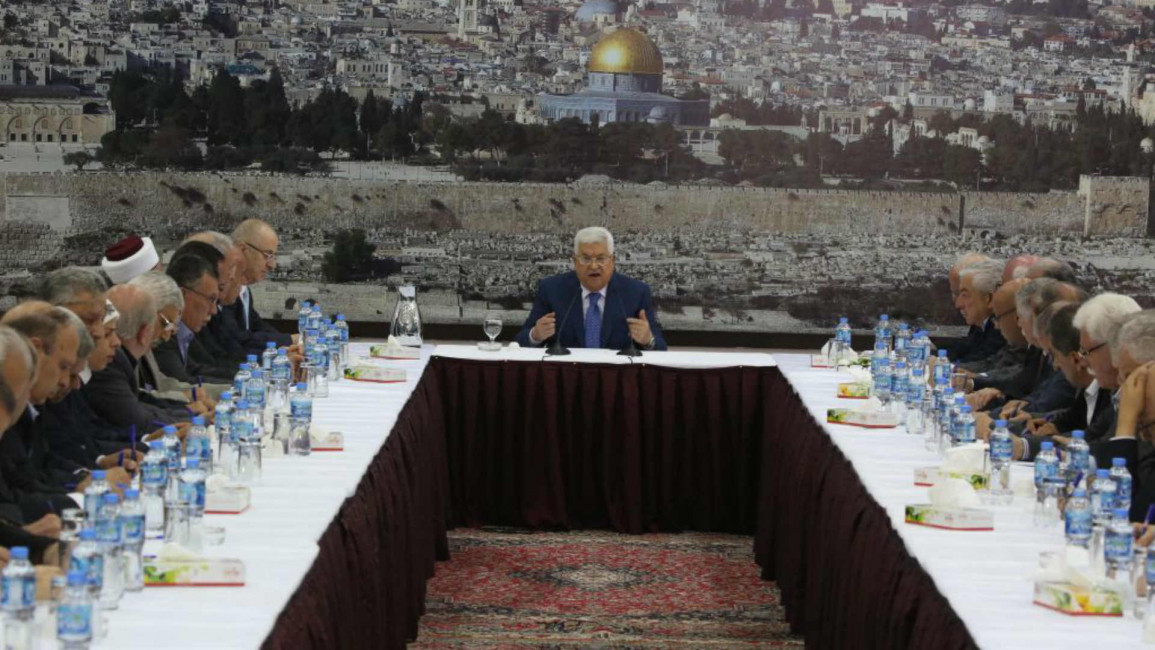
The tragic governance crisis in Palestine
Abbas and his advisors had been questioning the usefulness of the Ramallah-based government for some time, considering the failure of protracted attempts at national reconciliation between Fatah and Hamas.
Abbas accepted the resignation of Hamdallah's government, which he insisted will continue "conducting business until the formation of a new government".
The political crisis in Ramallah emerges at a very difficult juncture in current Palestinian politics. First, the resignation comes at the height of the ongoing crisis in diplomatic relations between Ramallah and Washington, which began on 14 May 2018 with the transfer of the US embassy to Jerusalem.
Since then, it has culminated in the withdrawal of all forms of US assistance to Palestine, including humanitarian aid administered in the past by the US Agency for International Development and various American nongovernmental organisations.
Indeed, the Hamdallah resignation happened the same week as US security aid to the Palestinian Authority (PA), estimated at $60 million per year, ended as requested by the PA for various legal reasons that include the threats posed by the Anti-Terrorism Clarification Act of 2018 passed by Congress and signed into law by President Donald Trump on 3 October 2018.
 |
The abrupt resignation of Hamdallah and his cabinet will not contribute to a smooth and positive change in governance |  |
Second, Hamdallah tendered his resignation 70 days before Israel's parliamentary elections, scheduled for April 9, 2019 by the now-disbanded 20th Knesset. By all Israeli indications, the elections are expected to be hotly contested, quite competitive, and fierce.
In addition, commentators believe they will be quite intense in their focus on the Palestinians as already displayed by the cruel and racist campaign literature, statements, and advertisements.
As Elizabeth Tsurkov pointed out in her provocative opinion piece in The Forward, "A disturbing new trend has emerged in the political ads of the Israeli elections. Campaign ads seem to be competing over which candidate has killed the most Palestinians. These ads are horrifying. But they also tell us a lot about what - and who - is at stake in the current elections."
This governance crisis in Palestine is deemed as tragic for three main reasons:
-
Although change in leadership in Ramallah is long overdue and quite popular, with 64 percent of Palestinians favouring Abbas' resignation, the abrupt resignation of Hamdallah and his cabinet will not contribute to a smooth and positive change in governance at this time.
Twitter Post According to senior Fatah official Azzam al-Ahmad, "one of the central aims of the next government [in Ramallah] will be to isolate Hamas in the Gaza Strip." In other words, Fatah's goal is to form a factional government to the exclusion of Hamas, which is not a constituent member of the Palestine Liberation Organization (PLO).
-
Isabel Kershner's 29 January headline in The New York Times, "Palestinian Government Resigns, With No Clear Replacement," is telling. This is not an optimal way to effect change in Palestine amid regional turmoil. Besides, the PA's haphazard handling of the resignation is apt to produce more rather than less divisiveness in Palestinian ranks, to the detriment of an already weakened national cause.
Already, potential candidates for the prime ministerial position in the next government began campaigning actively even before the resignation was formally accepted by President Abbas.
The candidates include Fatah Central Committee member Mohammad Shtayyeh, PLO Executive Committee Secretary-General Saeb Erekat, Palestine Investment Fund Chairman Mohammad Mustafa, and former Civil Affairs Administration Minister Hussein al-Sheikh. -
The formation of a factional government dominated by Fatah and excluding Hamas will most likely institutionalise the current political division between both movements and handicap the new government before it is formed.
It is somewhat puzzling to dismiss a national unity government for failing to end the division with Hamas then to replace it with a factional government that consecrates the same division. Hamas officials quickly dismissed the move as an attempt to marginalise and exclude the group from Palestinian politics.
Hamas spokesman Hazem Qasem commented, "It is a new blow to unity by Fatah, overriding all reconciliation endeavours." He added, "the only beneficiary of this decision is the Israeli occupation."
It is quite disheartening to witness both Fatah and Hamas leaders engage in a blame game over this tragic development.
 |
It is quite disheartening to witness both Fatah and Hamas leaders engage in a blame game over this tragic development |  |
Fatah focuses its criticism on Hamas' intransigence and refusal to cooperate with the national reconciliation government, particularly in terms of the agreed transfer of power in Gaza to Hamdallah's cabinet.
Hamas, on the other hand, accuses Fatah of authoritarian control and unwillingness to share power equitably with Hamas.
In doing so, both groups are underestimating the long-term damage of this decade-old split in Palestinian public opinion as well as its detrimental effect on Palestinian strategic objectives, including an end to Israeli occupation and an attainment of independent statehood.
Khalil E. Jahshan is the Executive Director of Arab Center Washington DC.
Follow him on Twitter: @khalilejahshan
This article was republished with permission from ACW.
Opinions expressed in this article remain those of the author, and do not necessarily represent those of The New Arab, its editorial board or staff.




